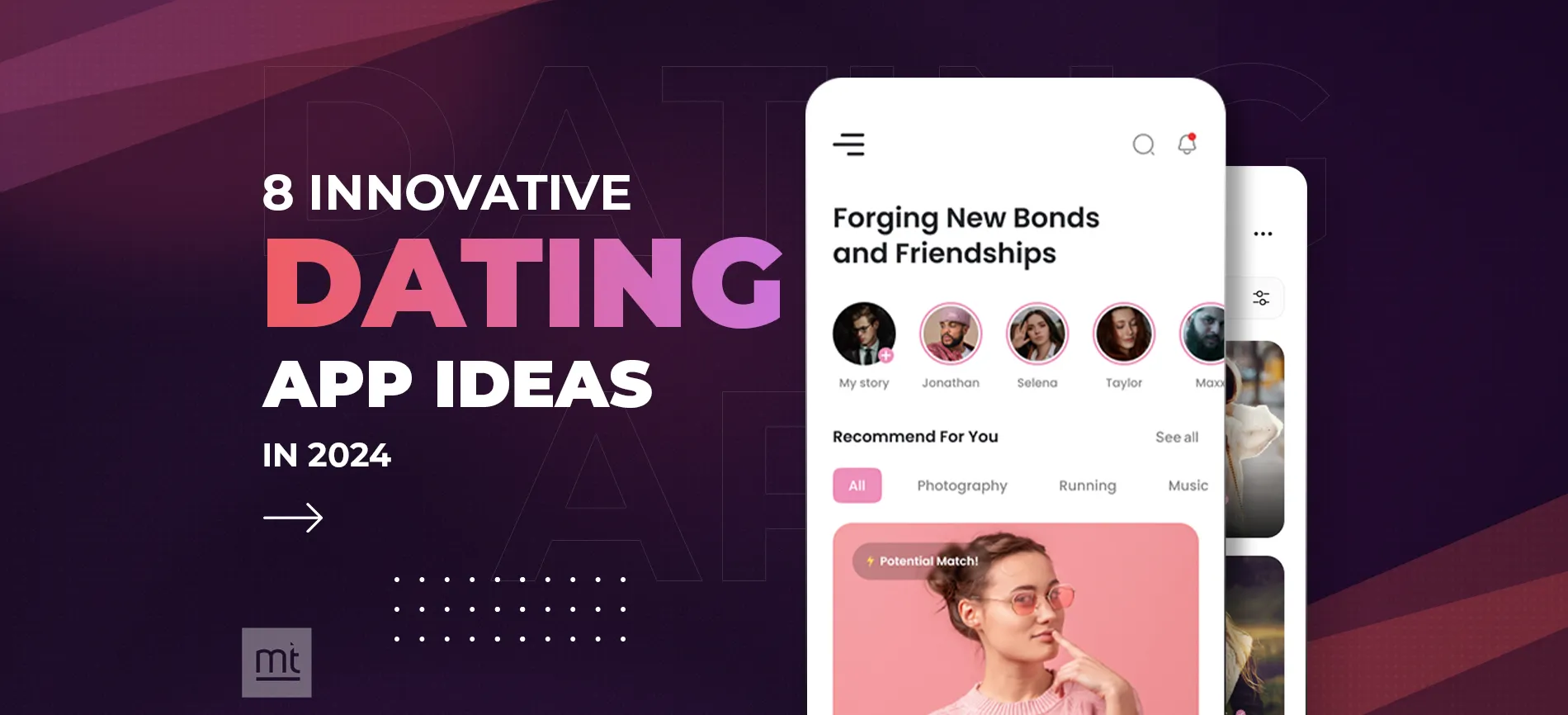Get Free Trial Week Developer Access, Try Before You Hire. Click Here to Claim Now
Introduction:
Building an app is an exciting journey of every business, but how long does it take to make an app? This is the first question most clients ask during the first call or meeting. As the competition grows among mobile app development companies, everyone wants to launch their app and make it available to users.
Mobile apps are today an undeniable part of life. Whether you want to order food, shop for something, make a payment, or book anything. Today's generation depends on mobile apps for the majority of routine tasks. The latest survey says that Android covers over 71.42% of the global market share, while iOS has a 27.93% market share. According to Statista, consumers across the world spend over 36.2 billion US dollars.
If we look at the recent data of March 2025, the App Store currently has 1.9 million apps, and the Google Play Store contains 2 million apps. And the numbers are constantly increasing with the rise of mobile app development in various industries.
In this blog, you will get a quick answer about how long does it take to develop an app and learn about factors affecting the Mobile app development timeline, and useful tips to speed up your app development.
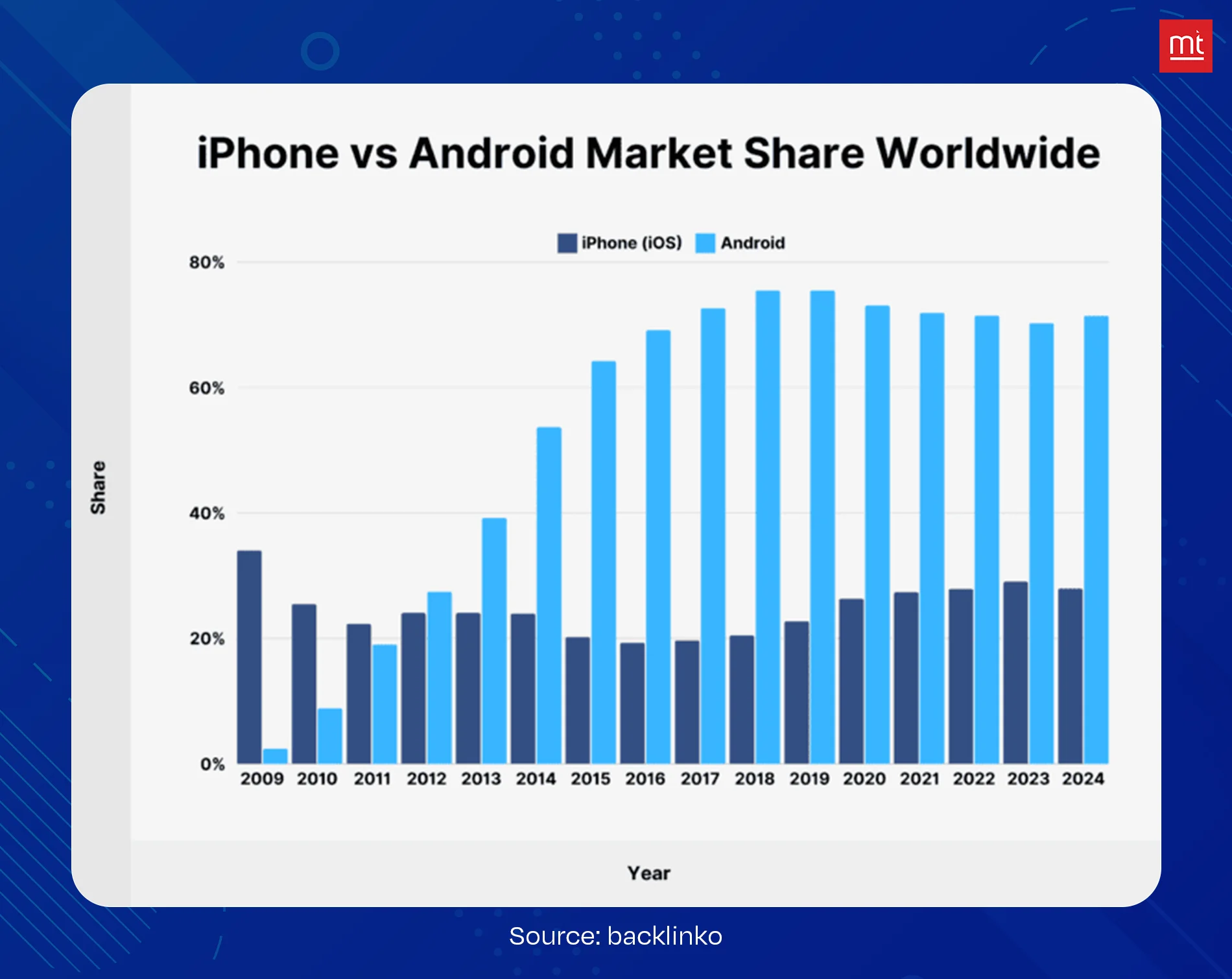
How Long Does an App Take to Make Based on Complexity?
It usually takes 3 to 9 months to develop a mobile app. The App Development Timeline can vary according to the complexity of the app. Below is the app development timeline based on its complexity.

1. Simple App Development
The apps with basic functionality, like a calculator, a simple chat app, notes, or with basic operations, can be developed within 2 to 4 months. Because this type of app doesn't need complex designs, back-end logic, and advanced features.
2. Average App Development
This type of app has moderate functionalities form filling, validation, authentication, payment gateway, etc. It usually takes 4 to 6 months to develop.
For example, an e-commerce app, HRMS, salon and spa booking, or any type of booking app can be considered a medium complexity app.
3. Complex App Development
Enterprise-level apps, games, or marketplace development come under complex app development. It usually takes over 6 months, minimum to 12 months, or even more. It includes advanced functionalities like AI, AR/VR, ML, IoT, and complex integrations as well as back-end logics and codes.
The examples are industry-specific apps like a healthcare app, a fintech app, a trading app, and many more.
How Long Does an App Take Based on Types?
The majority of clarity about the app development timeline can be calculated from the complexity of the app and the app type. The table below will give you a detailed idea about the types of apps and their development timeline, with examples and features.
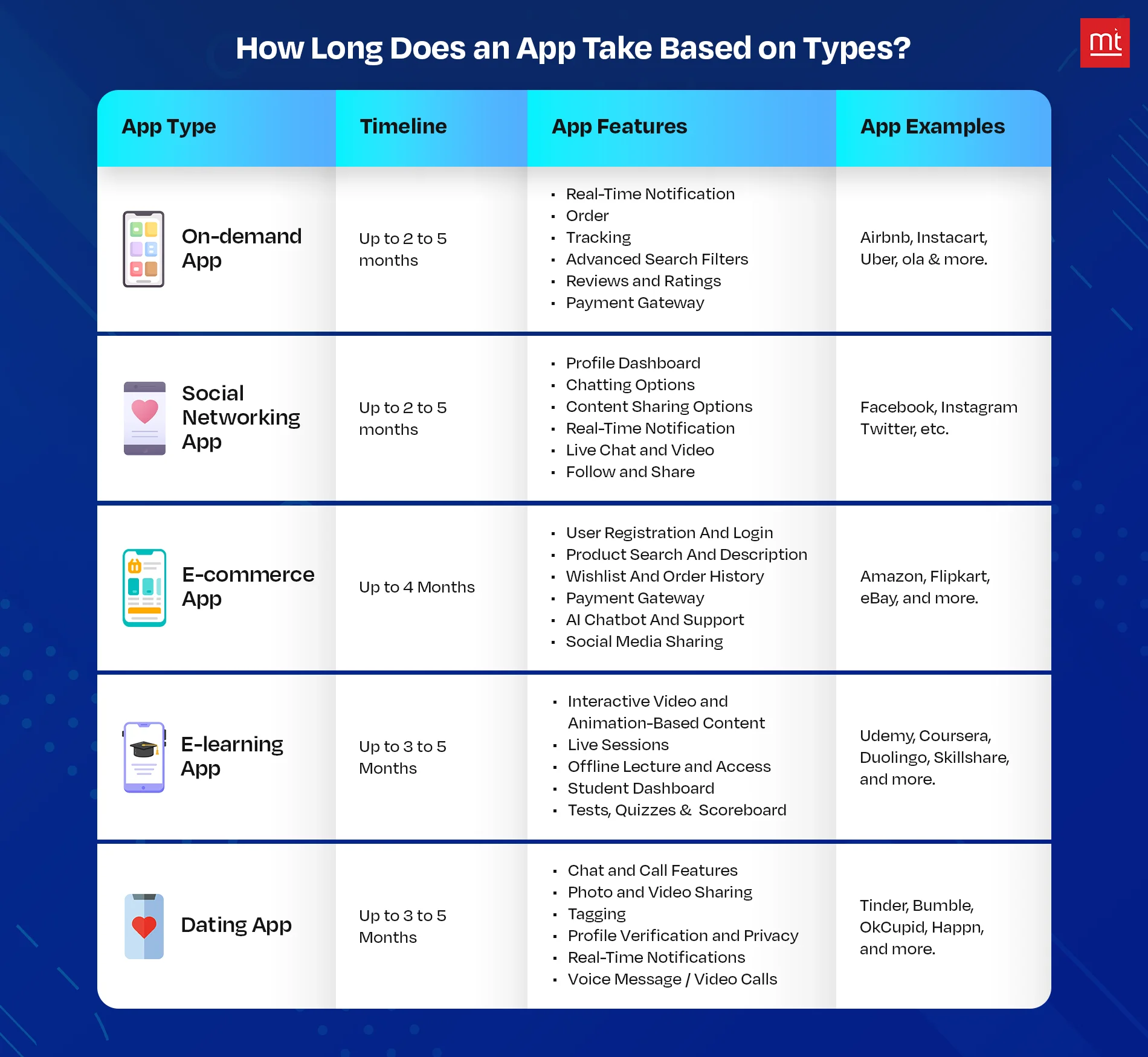
App Development Timeline According To Various Stages Process
Forming a Clear Business Idea
Research (1-2 weeks)
Idea validation (business idea and analysis)(1 week)
Product strategy (1 week)
Prototyping - design sprints (2-3 weeks)
Prototype validation (1 week)
Designing (1- 2 months)
Development
Testing
Deploying to the app store
Maintenance and Support
How Long Does It Take to Conduct Market Research for the App?
Before developing the mobile app, market research is the first and important step of the app development lifecycle. It includes understanding the core needs of the users to make sure your app serves its purposes by targeting the right audience. Every business has a unique market research strategy according to its competitors and the type of industry it belongs to.
The table below shows the estimated timeline and phases of market research.
Phases of Market Research | Estimated Timeline |
Researching the app idea | 1-2 weeks |
Idea validation | 1 week |
Create a SWOT analysis | 2 weeks |
Make relevant product strategies | 2 weeks |
How Long Does It Take to Prototype the App?
Making prototypes takes a few weeks to months, according to features and complexity. After finalizing the app strategy and the core requirements, the BA team will start making wireframes to understand the app’s flow and functionality. This gives an overall idea of user experience, like how the app features will be used by users, and find the pain points during the prototype test.
Phases of prototyping | Estimate timeline |
wireframing | Around 4 weeks |
prototypes | 1 to 2 months |
How Long Does It Take to Design the App?
Though the timeline of the design phase can sometimes be impossible to guess because of its iterations. But it usually takes over 1 or 2 months and may extend depending on the nature of the app and the client's requirements. At this phase, designers create UI/UX screens of the app, choose suitable colors, fonts, and other design factors suitable for the brand. Designers might need to go back and forth and adapt the app according to the latest design practices.
How Long Does It Take to Code the App?
You must accept that coding is the most time-consuming step among all because it includes developing front-end, back-end logics, integrations, and many more things. Once designs are finalized and prototypes are tested, mobile developers will start building the app as per the requirements mentioned.
Below is the table to give you more ideas.
Development stages | Estimate timelines for this |
Specifications and overall features | 1 month |
Front-end development(UI/UX and graphics) | 3 to 4 months or more |
Back-end development (API integration) | 6 to 8 months |
How Long Does It Take to Test the App?
Once the app is built by developers, it's the responsibility of QA and testers to test each module, feature, and functionality of the app. At this phase, experts analyze the code and check the app's usability, functionality, security, responsiveness, and many factors.
Testing Type | Estimated timeline |
Functional Testing | 1–2 weeks |
Usability Testing | 3–5 days |
Performance Testing | 4–7 days |
Compatibility Testing | 1–2 weeks |
Security Testing | 3–7 days |
Regression Testing | 1–2 weeks (ongoing as needed) |
Beta Testing | 2–4 weeks |
Automated Testing Setup | 1–2 weeks (initial setup) |
How Long Does It Take to Launch an App on the Play Store and App Store?
The app can't be released directly on the App Store or Google Play Store. The app is initially launched as an alpha and beta version, where alpha is the version to test with users, and beta is the final version, or you can say the improved version after alpha.
Release type | Estimated timeline |
Google Play Store Review | Few hours to 7 days |
Apple App Store Review | 1 to 3 days |
First-Time App Submission | 3 to 7 days (may vary) |
App Update (Play Store) | A few hours to 3 days |
App Update (App Store) | 1 to 2 days |
App Store Rejection Fix & Resubmission | 2 to 5 days |
Pre-Launch Setup (Metadata, Assets, QA) | 2 to 5 days |
Here is how app launching works:
- Once you submit your app to review at Google Play Store or app store, they will follow the compliance policy, whether your app meets the standard app guidelines. Apple’s store policy is more strict than Google Play Store because it checks for design, performance, privacy, and many other factors.
- Especially if your app is new to the App Store or Google Play Store, it can take more time because this involves many checks and developer verification too. While existing developers who have previously published an app might take less time.
- In case your app is rejected by the app store or Google Play Store, you might need to fix the changes according to the reason. Hence, this also adds extra days in the timeline.
Which Factors Affect the App Development Timeline?
Again, things don't end here for question: How long does it take to create an app. Apart from the development stages, there are a lot of factors that impact the app development timeline. Let's see all the factors one by one below.
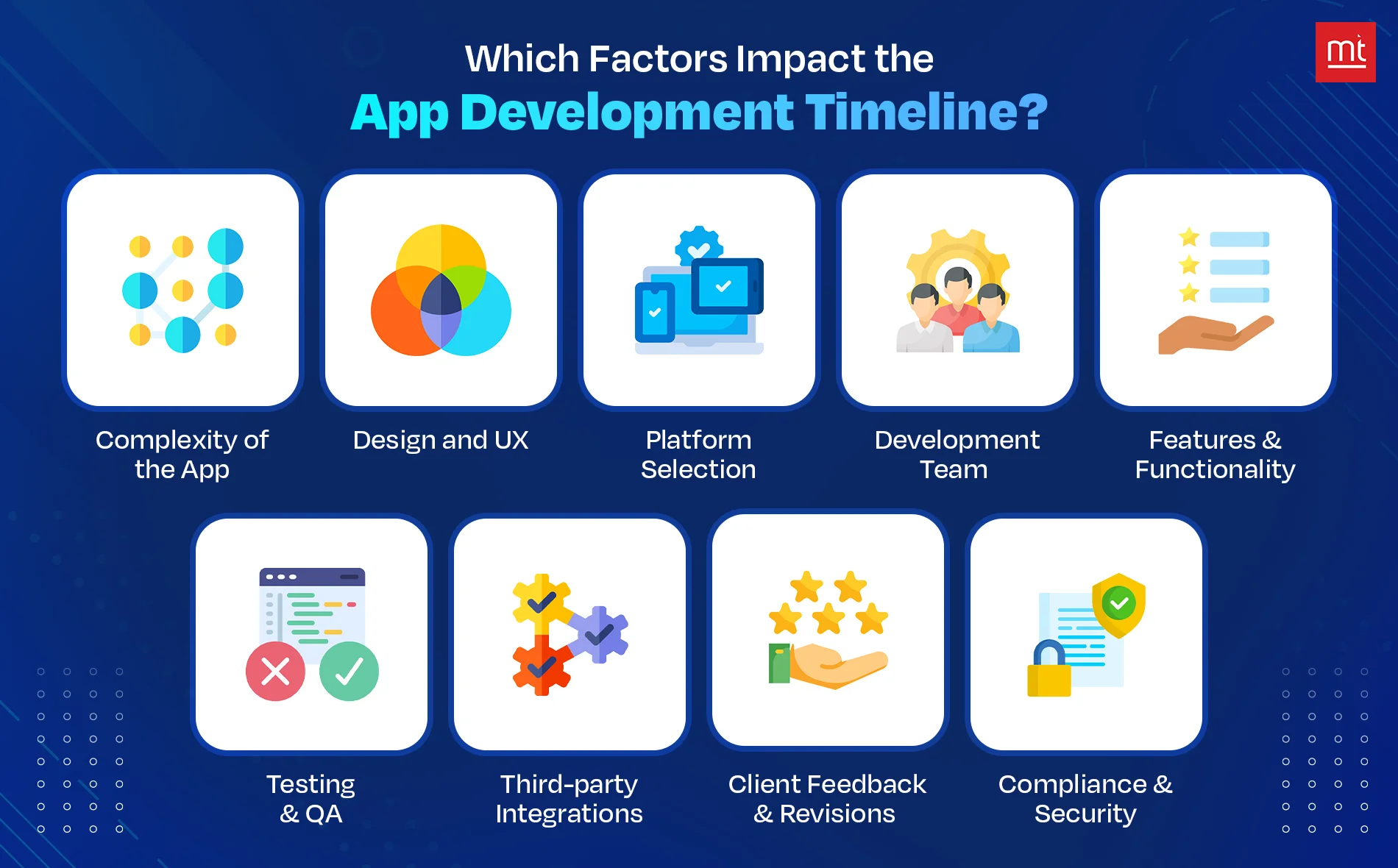
1. The Complexity of the App
The complexity of the app refers to how advanced, lengthy, or technical your app is. The logic is very simple. The simple apps are less complex and they have basic features that experienced developers can easily complete within a few weeks or months. While the app that needs custom coding, integrations, API, and advance-level features might take time developing and testing.
2. Design and UX
UI/UX and app design are related to user experience and overall performance, and the same applies to this factor also. Simple designs like a calculator or single-page application can be built in a less time frame, while an app with high-quality visuals, animations, and layout takes longer.
3. Platform Selection
Also, the app timeline gets impacted whether you are making an individual app for iOS or Android. Creating a separate app is time-consuming as it requires writing separate code and logic. Cross-platform app development is the best choice if it fits your business requirements and meets all the requirements.
4. Development Team
If your team is less experienced and has not handled a certain kind of project, the timeline can extend. The one who is experienced with a similar kind of app development project can handle the work more speedily and fasten the overall development cycle.
Other than this, the location of developers, expertise with certain technologies and tools also matter.
5. Features and Functionality
If your app has a long list of features, it can take more time. Simple features like page navigation, user registration, etc, can be done in a few weeks, while integrating complex features and building complex functionality will add more time.
6. Testing and QA
Testing is the phase where you find lots of bugs. Depending upon the testing method and environment, there is a possibility of different bugs arising.
7.Third-party Integrations
If the app is industry-specific or needs any external integrations, such as payment gateways, maps, or CRM. It takes time because you need to make sure of security and performance, both.
8. Client Feedback and Revision Cycles
Even after the app is developed, there are still chances of revisions to come from the client’s side. For the safe side, you must also consider some time for revision and refinement.
9. Compliance and Security Features
Apps like fintech, finance, stock, crypto, trading, etc, need high-level security, secure payment gateway integration, and encryption. This can add extra time in implementing data protection, testing, and other stuff.
What Factors Can Slow Down Your Mobile App Development Flow?
It's also important to consider factors that can slow down your workflow. This helps to give an accurate timeline to the client without disappointment.
1. Mid-project Changes
The app development is a constant process and updates are likely to come with the passing time or evolving trends. If your client finds a new trend related to their industry and asks you to make an instant change in the app, it can mess up the timeline you expected.
2. Assigning to Inexperienced Developers
If the app development is handed over to inexperienced developers, it can lead to inconsistency or other bugs. It's important to assign the project to a developer who is skilled and experienced in similar kinds of projects and well proficient with advanced tools and tech.
3. Using Complex Technologies
Most of the challenges in the app development are technical. Hence, avoid using complex technologies if they're not required for that app development. High-performing apps can also be developed with easy and flexible technologies.
4. Industry Difference
Industry difference also impacts the app development timeline. The Mobile app development company that has been developing apps for the e-commerce and retail sector is more likely to have more grip and expertise in building that type of app.
Same way, the company that has the majority of clients for healthcare app development will create the best app related to healthcare.
Top 5 Tips to Speed Up The Time of Application Development?
Apart from all these factors, you can still speed up your app development time and easily achieve the deadline. Here is how.
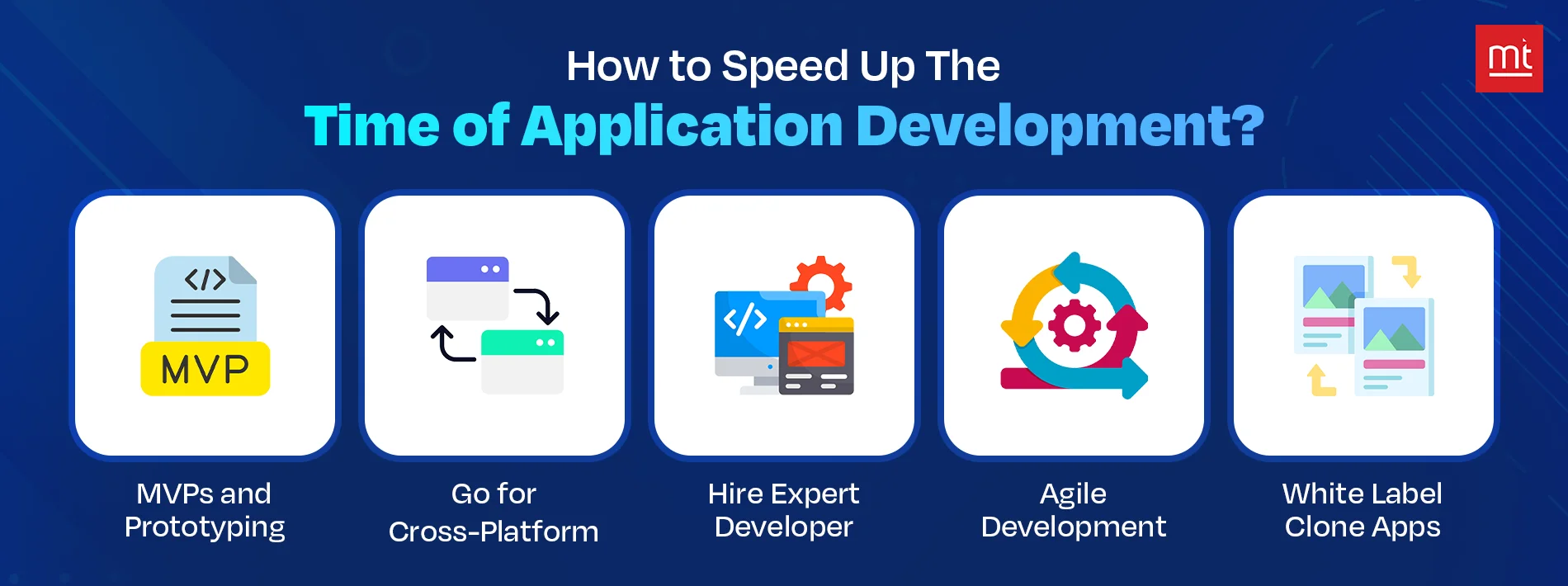
1. MVPs and Prototyping
Instead of spending time and effort on building a whole app, first develop a working MVP with only the important features of the app to get approval and useful feedback from the client. This will also prevent you from spending on unnecessary modules and get clarity of the features that are important in the app.
2. Go for Cross-Platform
If you have no specific platform needs, then choose cross-platform app development so you don't need to code separately for iOS and Android.
3. Hire a Professional Developer
Mobile app development is a long and ongoing process that will always need to be updated or modify the features/functionality after some time, hence always hire a professional developer for the same app development project who can handle the code and make modifications easily in the future when needed.
4. Agile development
Use agile techniques to carry out the project in an organized way. The app development will get executed in a better way when it's broken down into small sections.
5. White Label Solution of Clone App
You can also use the on-demand or clone app option if the client's requirement is similar to e-commerce apps, Flipkart, or a cab booking app- Uber, food delivery app - Swiggy, etc.
Industry Expert Advice on App Development Timeline
Check out what industry leaders advice on pitching your business app idea to investors.
Expert Advice 1: Build MVP First: Avoid Scope Creep and Streamline Team Communication
Creating our education platform around coding gave me a lesson on how timeline forecasts are sometimes over-ambitious. I have seen many founders grossly underestimate development by 2-3x and I was no different in the beginning.
The worst timeline killer is not the technical complexity but the scope creep We began with a basic tutorial system and over time introduced personalization based on AI, the ability to run code in real time, and interview simulation. The small addition led to weeks of further work.
We were haunted with database architecture decisions months later. We originally adopted a document-based approach that appeared to be quicker to implement, but the interactive coding exercises proved to be too costly to scale when using the document-based approach and we had to completely switch to PostgreSQL. The three weeks diversion was turned into a six-week nightmare.
The third party integrations were always 40 percent slower than planned. The execution sandboxes, payment processing and authentication systems also had undocumented peculiarities that only became evident during implementation.
The best approach I found is to create only a minimal viable product and then to develop serves according to what the users say not what I think they might want. We started with simple tutorials and introduced AI features only when we were sure that users were engaged.
Communication structure is very important in a team Standups became crucial when we reached four developers since they would ensure that there was no duplication of efforts and that integration problems were detected at an early stage.
Mircea Dima, CTO / Software Engineer, AlgoCademy
Expert Advice 2: Prevent App Delays: Define MVP Upfront and Streamline Team Collaboration
The development timeline of apps usually experiences delays because of scope creep during their construction and growth phases. The early development of DIGITECH taught me this lesson through personal experience. The development of an app reached its midpoint before additional essential features emerged to the project. The project duration which started at 10 weeks extended to 16 weeks. The main delay stemmed from continuous changes rather than coding work.
The strategy which brought me the most success involved establishing clarity at the beginning of the process. I dedicated extensive time to wireframing and user flow mapping before beginning any coding work. During meetings with clients I encouraged them to adopt user perspectives by asking them to identify their essential first thirty-second user action. The exercise reduced the number of desired features to essential ones which helped us concentrate on vital elements.
The main reason for delays occurs when design and development teams fail to communicate effectively. I established a living design system that contained reusable components to solve this problem. The use of a shared library between designers and developers reduced rework significantly which made project timelines more predictable.
Founders should establish their MVP definition early and maintain it with strict discipline according to my main advice. Additional features can be added after launch but attempting to launch with complete functionality at once will result in lost time and money and diminished momentum.
Darryl Stevens, CEO & Founder, Digitech Web Design
Expert Advice 3: Prioritizing, Stay Flexibility, and Staying Focused: Keys to Effective App Development
In my experience, app development schedules will take as long as it takes depending on how well the scope is outlined and what the complexity of the features are. The difficulty I have encountered is the speed and quality balance. It should be noted that it is important to deliver the core functionality without being too distracted by adding too many features too soon.
The most important factor to prevent delays is flexibility. Organizing tasks into a series of small bits and pieces and regularly learning the feedback of the user will make the process of development more efficient as well as responsive to what the market requires. The real keys to success are clear priorities, flexibility and staying focused on the problem you solve for the end user.
The sooner you are able to test, learn, and modify, the sooner you will begin to see results. It is a process of improvement, not perfection. Don't stop and you will achieve success.
Juan Montenegro, Founder, Wallet Finder.ai
Conclusion: How long does it take to build an app?
So, by reading this blog, you might have got answers to your question: how long does it take to create an app? Today, there are millions of users, and the number will continue to grow in the upcoming years due to digital transformation. Every app development project has a different time duration according to the needs. At Manektech, we have consistently delivered high-quality mobile app development projects to thousands of clients worldwide.
If you have amazing mobile app ideas in mind, we can help you create a roadmap with strategies to achieve your business goals. Reach us today to learn more about the mobile app development cost.
FAQs:
1. How many mobile app developers are needed to make an app?
Usually, a team of 4 to 10 mobile app developers is a good choice to divide the task efficiently and build a successful app. Plus a project manager is must to ensure the right execution of the app development and manage everything on track.
2. How much time does it take to get your app approved on the Apple App Store?
An iOS app may take 1-3 days to get approved in the initial days and 24 hours to become available in the App Store. If there is any issue, it might take more time to review. They sent email notifications once the approval is accepted.
Subscribe to Our Newsletter!
Join us to stay updated with our latest blog updates, marketing tips, service tips, trends, news and announcements!


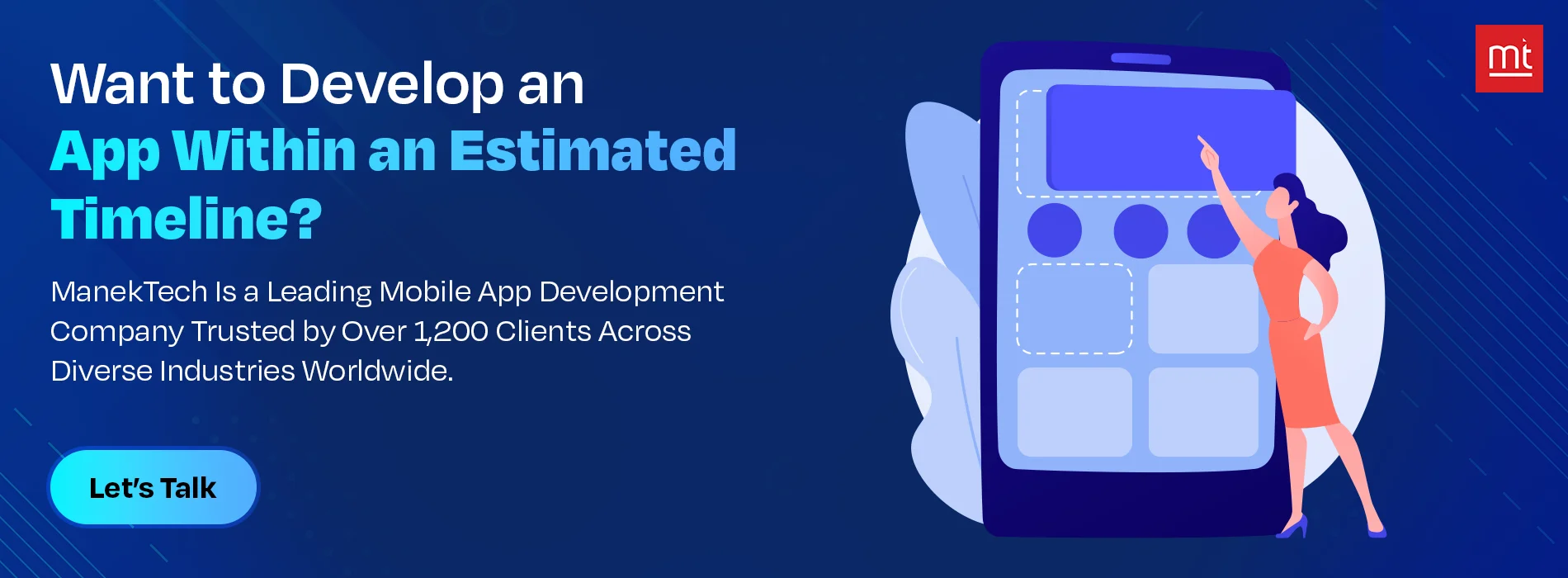


![How Much Does It Cost to Build a Mobile App? [Checklist]](https://www.manektech.com/storage/blog/image/1765777729.webp)

